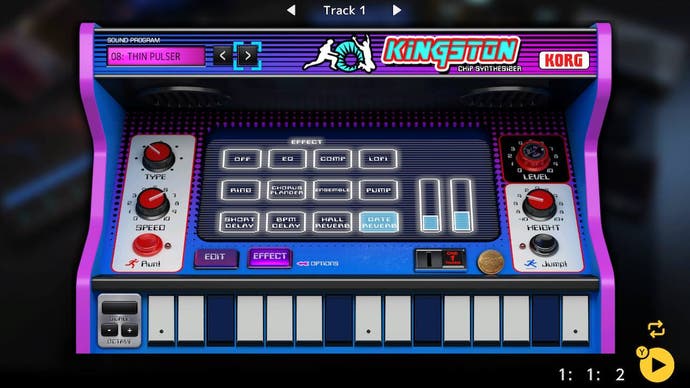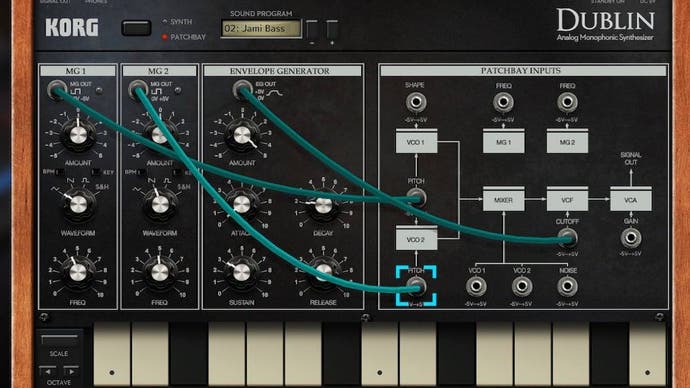The Switch's new music gadget is half broken but still brilliant
Korg blimey.
What a week it's been for creative sorts on the Switch. Labo might have stolen the headlines - even if it's not quite stormed the charts just yet - but I lost the best part of a weekend tinkering with another toy that's just found its way to the eShop. Korg Gadget is a handsomely featured digital audio workstation - or DAW, if you must - that brings a selection of music tools to the Switch, all of which are enough to enable some sweet, sweet sounds. Or some absolute dirge, more likely.
Still, the Korg Gadget excels in being extremely user-friendly, even to someone with next to no ability or experience beyond fiddling with Fruity Loops. This isn't a rival to Logic Pro or Ableton, of course - instead, it feels like a successor to the likes of Codemasters' outstanding Music 2000 (a piece of software, legend once had it, that Dizzee Rascal produced his debut album on - though like most legends, it sadly proved not entirely true), and going back a little further to Nintendo's own Mario Paint.

And it's a successor of sorts to Korg's line of DS and 3DS software - with the developer of the 3DS outings, Detune, working on Korg Gadget. This is a slightly different proposition, and arguably a more welcoming one too; a collection of 16 gadgets, ranging from drum machines to synthesizers and with some more familiar than others, this is geared towards laying down tracks in as frictionless a fashion as possible. The Chicago gadget, with its silver faceplate, does a more than passable impersonation of Roland's iconic TB-303, and it sounds pretty spot-on too, delivering those same soft whip acid basslines. Elsewhere you'll find appropriations of 808 and 909s, and soundbanks that'll deliver the crack and snarl of a junglist drumline. It is possible, with the minimum of effort, to get some mildly impressive results.
It helps that the presentation is so beautifully toy-like, from the Moog-like patchbay of the Dublin synth to the heavy duty industrial facade of the Kiev synth. There are some neat, Switch-centric flourishes too - using the Joy-Con you can select and then adjust various knobs by rotating the controller, an action met with some deliciously tangible use of HD rumble. Sequencing is also straightforward, and surprisingly swift - shifting between tracks is snappy, while editing, copying and pasting is all thoughtfully mapped to a clean and simple menu. Multiple players can also collaborate on tracks in tandem, delivering a new and deeply satisfying spin on couch co-op. As a game, Korg Gadget is freeform but often fascinating.
A shame it falls at a few major hurdles, then. Touchscreen support on the Switch tablet is strangely sporadic - you can fiddle with keyboards, but not with knobs, and it's hard to know exactly when the touchscreen is active, though it's often useless whenever you feel you need it most. Elsewhere there's no support for MIDI controllers. Even more frustrating is the inability to export or share songs - something which is offered up readily on the iPad version on which this is based - which seems to be down to restrictions that are unique to the Switch.
If you can stomach those shortcomings - and the knowledge that the slightly cheaper iOS version comes complete with the ability to export audio - it's all worthwhile, and it's worth remembering that the Switch edition comes with its own perks too. With its collaborative mode, that soft click click click as you turn a dial and place a mouth puckering filter over a bassline, this feels geared towards a more playful kind of music making. Put it alongside Labo and it's part of the a deeper, more creative spin on the concept of play.
Despite some caveats, Korg Gadget is a brilliant addition to the Switch's line-up. Approach this as a toy, or a tool for noodling away, and it's an often exceptional piece of software that can, in the right hands, enable some pretty deep cuts. So how about being able to pair Korg Gadget up with the Labo's piano? Now that really would be something.


